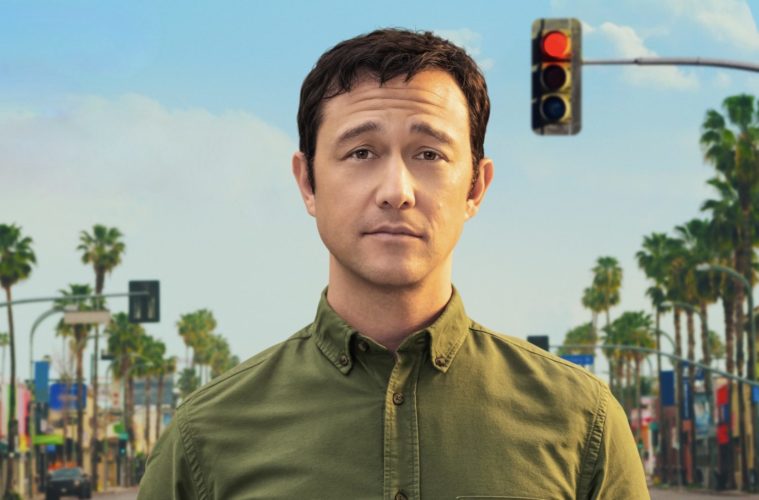Joseph Gordon-Levitt is a grateful guy. But chatting by phone with the actor, director and content creator last week, we aren’t surprised by how relatable and real he is, talking about himself and his success. If you follow him on social media, his good dude vibes are undeniable. The L.A. native is more than an accomplished actor, he’s a music-maker and a storyteller, into celebrating creativity and connecting with others in a positive way. He even started his own social media platform to do just that. He’s played lots of likable people and stretched himself to play some not so likable ones. But Mr. Corman, the new Apple TV+ show he created, stars in, writes and directs, aims for something headier and harder to peg. The titular figure is his most complex character ever, and as JGL (as many call him) tells it, there are a few reasons for that, starting with his own gratitude.
“It really came from me just thinking about my own life a lot, and feeling so grateful for so many things,” he explains. “I found a woman I love and she’s a perfect partner for me. We have our two kids. I have two parents that are cognitive and reliable people. I get to do work that I care about. I’m healthy and I get to live in a safe place… And I think a lot of those things come down to luck. That is something I think about all the time. How much do I deserve any of these things that I’m so grateful for? How much is just luck? It got me thinking about a character who is a lot like me, but who maybe just had a few different strokes of luck. That’s where this character comes from. He grew up the same place I did, went to high school the same place I did – Van Nuys High – and he’s like me, but there are some differences.”
So basically, Mr. Joshua Corman is Mr. Joseph Gordon (minus the hyphenate Levitt) in an alternate universe, but the real point – which becomes pretty clear while watching the show – is he could also be you or me if circumstances/timing/choices were different. Life is precarious and lifestyle even more so. Most of us are damn lucky to be who we are. But, especially in today’s world of self-absorption (and selfies), the exercise of counting our blessings when we feel down or sorry for ourselves doesn’t always work. The show’s not-so-subtle subtext tackles this disconnect and shows how privilege (recognized or otherwise) and mental health problems can create some confusing inner conflicts.
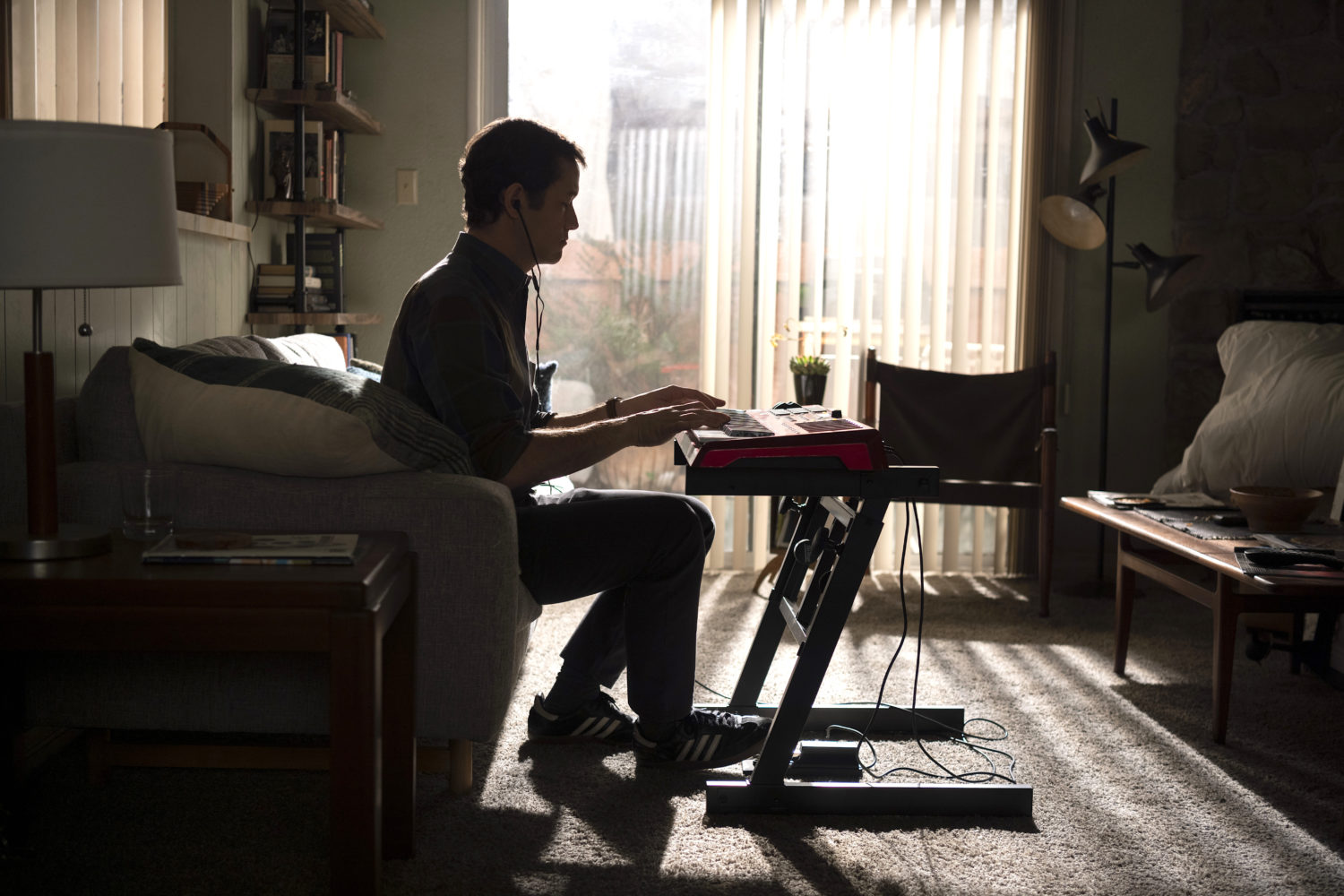
Making music in ‘Mr. Corman’ (Apple TV+)
“Anybody who’s able to watch TV or read L.A. Weekly has it pretty good compared to a lot of other people alive on the planet today who are struggling with really big life-threatening problems,” Gordon-Levitt says. “I think that we can all probably appreciate that experience. Still, I can sit here and list off the good things in life and I’m happy a lot of time, but sometimes my brain doesn’t want to let me be happy, and why the fuck not?”
Mr. Corman the character, is kind of your typical depressed L.A. millennial – and that’s sometimes as hard to watch as it sounds. A 30-something failed musician turned 5th grade teacher in the Valley, he only seems truly engaged when he’s in the classroom talking to kids or in his bedroom making weird but wondrous soundscapes that will probably never be heard. Every other moment in his life seems to be filled with unease, worry and contentiousness.
It’s not just that the protagonist is unhappy. He is stressed and distressed to the point of paranoia, which manifests with a persistent pounding sound in his head, meant to remind him (and the viewer) that all is not OK with the world. War, a pandemic or a fiery meteor colliding into earth could end it all at any time. And until that happens, humanity’s got plenty of struggle and ugliness, big and small, to contend with on a daily basis.
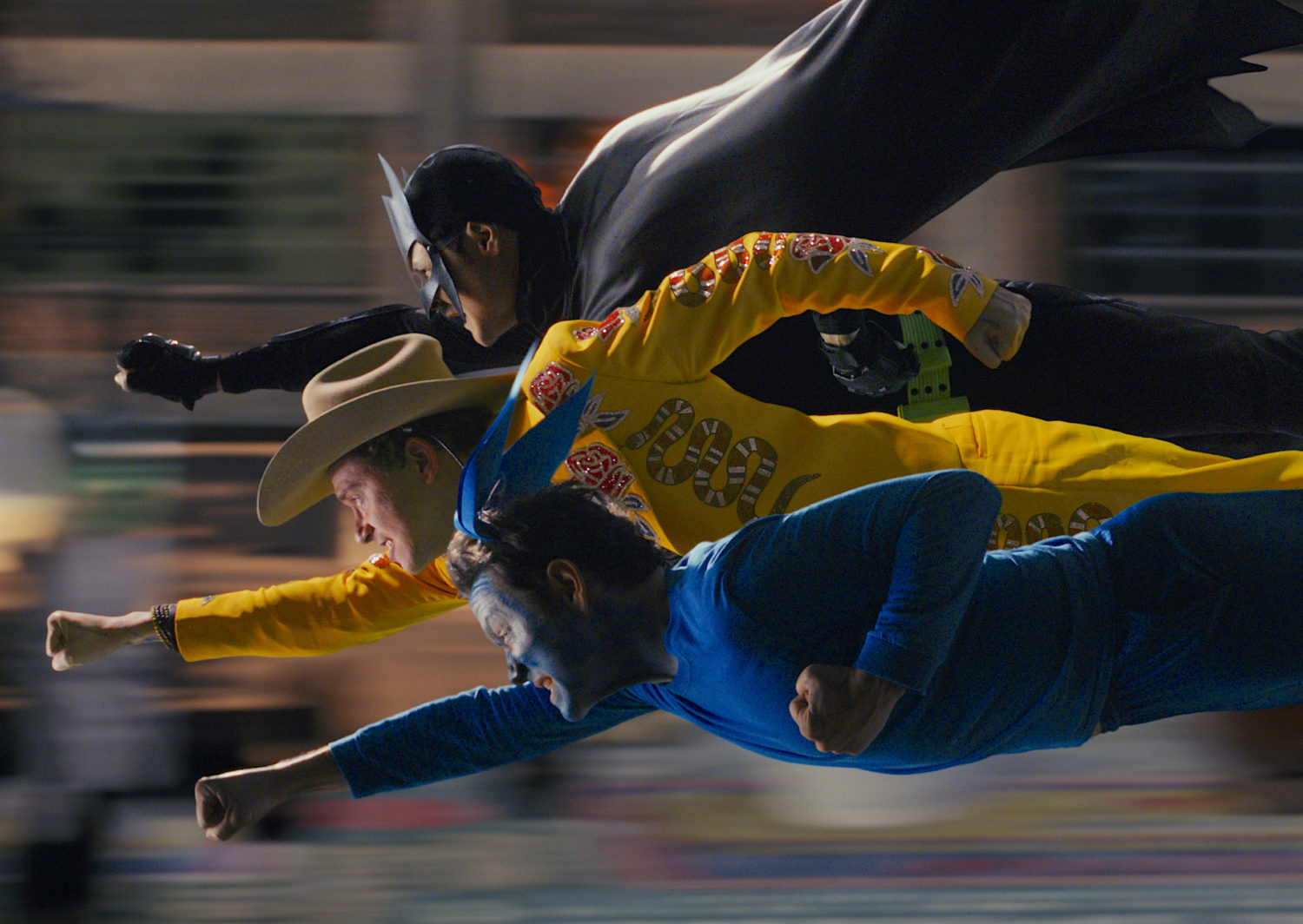
With Logic and Arturo Castro in ‘Mr. Corman’ (Applet TV+)
It’s some dark stuff, but it’s contrasted with moments of exuberance and light, thanks to the smattering of surrealist sequences, meant to convey each character’s thoughts and feelings in intriguing ways. JGL is having a lot of fun visually with this show. Some scenes look like paintings, others like scrapbook pages or collages. There are cool angles, trippy animated components, dream sequences, unique intros and even a couple song and dance numbers. What starts out feeling like a woe-is-me experience, becomes something richer and more exploratory as the first season’s 10 episodes progress, ultimately ending on a figurative and literal high note.
“I’ve been privileged enough to work as an artist and I definitely consider that very lucky,” Gordon-Levitt elaborates on his alter-ego vision. “Anybody who is successful as an artist, a lot of that comes down to luck. Josh is an artist who didn’t get those lucky breaks. He still loves music and a big part of the season is him wrestling and figuring out his relationship to his own kind of creativity. Also, I always thought if I wasn’t lucky to make money as an artist, I’d be attracted to teaching. Teachers are such heroes. I wish we lived in a world where teachers were celebrated more than entertainers.”
As an entertainer, Joseph Gordon-Levitt has definitely had some luck over the years, though he worked hard for his breaks. At 14, he was cast as an alien elder stuck inside a human kid’s body in the popular sitcom 3rd Rock From the Sun, working with acting heavyweights John Lithgow and Kristin Johnston for six successful seasons. He also scored a pivotal part in the Shakespeare-inspired teen classic 10 Things I Hate About You alongside Heath Ledger and Julia Stiles as a teen. Then he took a break from acting to go to Columbia University. As an adult actor, he’s turned in several memorable performances, in hits such as Inception, Looper and Snowden. But before he was really busy, it was his role in 500 Days of Summer opposite Zooey Deschanel that cemented his star power. To this day, that film has been the subject of debate. It wasn’t a love story, but an un-love story, with two sides (his and hers) and dueling views of a relationship and why it imploded. But who was right and who was wrong? As a big fan of the film who wavers on its message, we had to ask Joe (which his friends call him) for his take.

With Zooey Deschanel in ‘500 Days of Summer’ (FOX Searchlight)
“One of my favorite things about that movie is how it plays with perspective and reality,” he answers. “It does some clever but subtle things that show a certain reality and make you think ‘oh, I’m seeing the truth,’ when in fact there’s sort of an unreliable narrator in the mix. You have this very seemingly trustworthy narrator that speaks in the third person, and says… ‘Tom felt that blah blah blah.’ And you trust it because usually, the narrator is telling you what’s really happening. But if you look closer it’s actually not really happening the way Tom thinks it’s happening. And if you look closer you see that Tom has a lot of growing to do. He’s seeing things in a selfish way. I’ve mentioned this before, but the scene where Zooey – Summer – is telling Tom about a dream she had last night… the narrator comes in and just talks over her. And you don’t even get to hear her dream. I think that’s a brilliant way of showing that Tom is not even listening. He’s just thinking, ‘oh she’s telling me her dream. I must be really special, she must really like me.’ And it’s really no wonder that she breaks up with him. A lot of people say to me about that movie, ‘how could she break up with you?’ But if you look closely, the writing’s really on the wall.”
Talking more about the film, we agree that his way of telling Mr. Corman’s story is similar (in that it shows what’s inside the character’s head) but quite the opposite in approach. In 500, we get an idealized version of his character Tom and his relationship because the story is told from his point of view. In Mr. Corman, we see rather than hear Josh’s thoughts (and he clearly has growing to do as well), but his flaws are on full display. “And we are not hiding that,” JGL says. “It’s definitely two different watching experiences. I totally get that if you’re watching Tom’s idealized understanding of himself, that makes for a dreamy screen presence. But with Josh, you know all of his flaws are exaggerated, especially in the beginning of the season. He’s pretty insecure and has a lot of self-doubt, and that’s not as immediately dreamy. What I was going for in Mr. Corman was something honest above all else. Keep watching and see how he grows. And with each episode, he is getting a better understanding of himself.”
If you’re like us, you might not even like Josh from the first couple episodes, because to paraphrase RuPaul, “If you can’t love yourself, how in the hell is anybody else going to?” The kind of insecurity Josh reveals to the viewer is a huge turn-off and that’s intentional. Similarly layered new shows such as HBO’s The White Lotus and FX’s Dave, for example, ring true in their cringiest moments, making points about privilege and other inequities of humanity that really resonate. The best television right now isn’t always pleasant, but the ultimate payoff can be bigger and better. Still, in the real world, no one wants to show their vulnerability or self-pity to others, they want to project who and what they aspire to be.

With Debra Winger in ‘Mr. Corman’ (Apple TV+)
Which brings us to HitRecord, JGL’s social media platform that’s really more of a community. “I started it with my brother many years ago,” he says. “It’s all about being creative together. A lot of social media right now is about being competitive. You’re competing for followers or you’re competing for likes. The whole framework is set up to get people vying for attention.”
With HitRecord, the tagline is, “It’s not a competition, it’s a collaboration,” and in the current climate, it’s a refreshing change from what we all see on Facebook, Twitter, Instagram and Tik Tok. That’s by design. “The joy and meaning and fulfillment that can come from making something with other people, when you forget about how many likes you get or how many followers you have, is what makes me happy,” Gordon-Levitt asserts. “HitRecord is all about trying to reorient art and creativity around that. It is a bit different from how today’s social media platforms work. That’s because they make money by what I call mass surveillance advertising. That means that they have to optimize those platforms for the attention economy. They get people hooked on that feeling of getting attention. The more attention, the more ads they can sell. It’s addictive the same way that slot machines are addictive. But when you’re addicted to getting attention, I think that it can be poisonous to your creativity.”
HitRecord encourages its users to make and share their lives in fun ways on its site, and it also serves as an incubator and producer for many of JGL’s endeavors, including short films (Morgan M. Morgansen’s Date with Destiny and its sequel Morgan and Destiny’s Eleventeenth Date: The Zeppelin Zoo and Hong Kong Never Sleeps) and full length works like his acclaimed 2013 directorial debut, Don Jon, which saw him playing a porn addict trying to have a healthy relationship with Scarlett Johansson and later, with Julianne Moore. Mr. Corman also brandishes the HitRecord production logo before each episode.
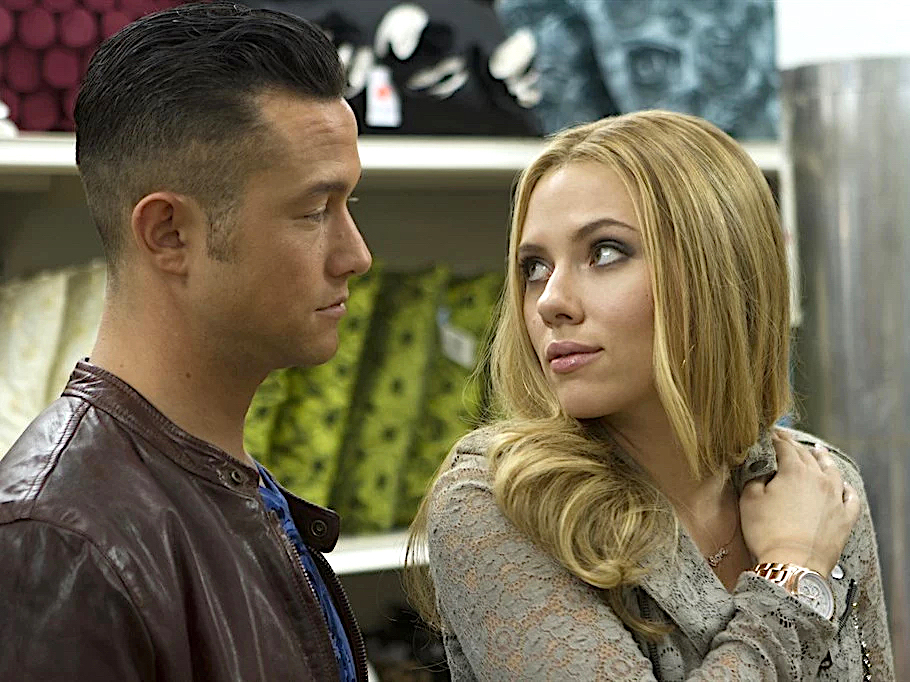
With Scarlett Johansson in ‘Don Jon’ (Daniel Mcfadden/Relativity Media)
Without spoiling the full story arc for Apple TV+ viewers (and we hope that people who don’t have the streaming service also get to see this transcendent television eventually, too) it must be mentioned that the show’s most powerful episodes, the ones that really make you feel things, are set in the reality of the COVID-19 era. The pandemic has amplified anxiety, depression and feelings of isolation for so many, and Josh serves as an awkward reflection of what that looks like, from teaching his kids and trying to have a date on Zoom, to obsessing over hand-washing and arguing over the efficacy of masks with his roommate Victor, played with affable warmth by Arturo Castro. Castro also gets his own episode “Mr. Morales,” and it’s one of our favorites of the series, answering the question many of us might have about delivery people and the lives they might lead (he’s a UPS guy) off the clock.
“Joe is the kindest, most thoughtful professional I’ve ever met,” Castro shares of his experience working with Gordon-Levitt. “He takes everyone’s opinions into consideration. Also, his Spanish isn’t half bad so I’m very biased towards getting directions en español.”
Of his character, which is one of the most authentically-written Latino men we’ve seen on TV for some time, he says, “I’ll always be grateful to him for having me on board. Victor is one of the most three-dimensional characters I’ve ever played.”
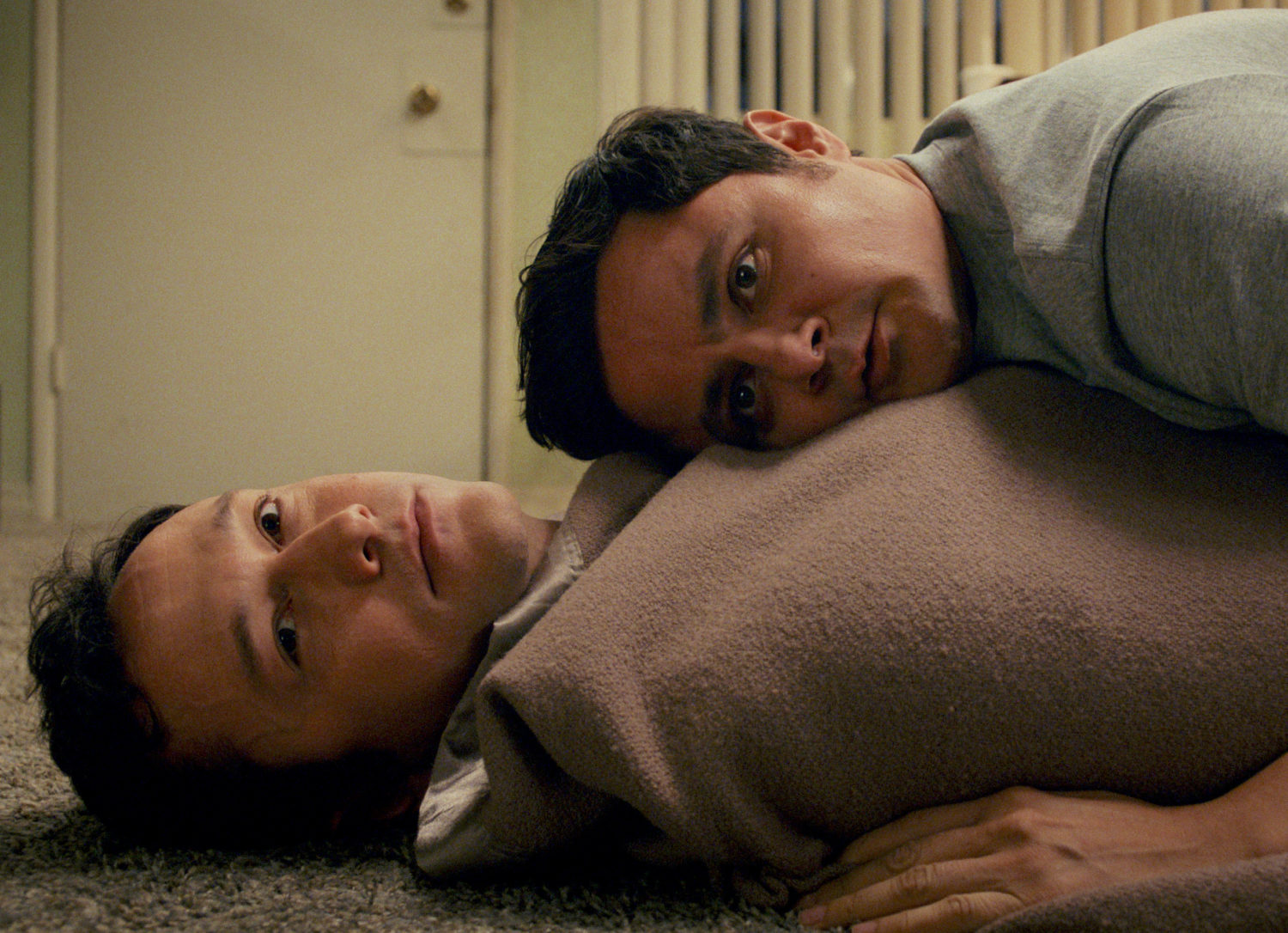
With Arturo Castro in ‘Mr. Corman’ (Apple TV+)
All of the supporting cast, by the way, is great, especially Debra Winger as Josh’s loving and long-suffering mom Ruth, and Juno Temple as his ex-girlfriend Megan. Temple, who worked with JGL on The Dark Knight Rises but didn’t have any scenes with him, says of the actor, “I remember, when I was younger, watching him in 10 Things I Hate About You and Mysterious Skin and thinking he was one of the greatest actors I’ve ever seen. So, getting to not only be directed by him but also getting to act with him was like a life-long dream come true. He was everything I hoped he would be and more: an extraordinary artist and very special human being. “
Temple gets to sing in the show as well, as the storyline saw the couple in a semi-successful band. The music, which is an essential component of the show, was created by Nathan Johnson, and features other cast members as well, including Winger and the rapper Logic (who acts for the first time on the show). It’s good enough to stand on its own and it does; it just became available as a soundtrack album on all the streaming services.
The virus made the show move from Los Angeles to New Zealand for a year to finish filming, but not before capturing plenty of the city in outdoor shots and settings. There are also frequent references to our traffic, landmarks and nightlife (Josh’s deadbeat dad goes on a long reminiscence about performing at the Troubadour, for example). Gordon-Levitt says the city’s energy and presence on the show was important.
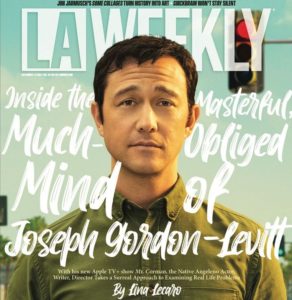
This week’s print cover story.
“Los Angeles gets represented in a narrow way. The world image of L.A. is Hollywood. I didn’t grow up in Hollywood,” he stops himself. “Well, I grew up working in the Hollywood industry. But I lived in the Valley. I really wanted to show L.A. in a different light because there’s so much in this city, and I love it dearly. I think if you watch Mr. Corman, you’ll see an L.A. that maybe feels more like an Angeleno made it.”
It does, and its realness is unflinching sometimes. In a few scenes, Josh is shown staring into the night, transfixed by homeless people and encampments around L.A. Most of us don’t need an explanation as to what he’s thinking, and it all goes back to what inspired the show to begin with: any one of us could find ourselves in the same situation if bad luck came our way.
“It’s not exactly light entertainment,” JGL admits. “But that’s my taste. When I watch something, I want it to make me feel, or think or even challenge me. That’s what I was going for. It’s less about an objective telling of a certain plot. When we depart from reality, that’s because real life doesn’t always feel like reality in my experience and sometimes you have these feelings that are just too big to show on the outside. Even if we don’t show what reality looks like, we show you what life feels like.”
Editor’s note: The disclaimer below refers to advertising posts and does not apply to this or any other editorial stories. LA Weekly editorial does not and will not sell content.
Advertising disclosure: We may receive compensation for some of the links in our stories. Thank you for supporting LA Weekly and our advertisers.

